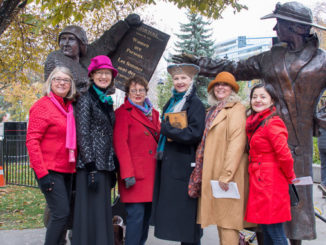In this interview, Cendrine Tremblay, Board Chair and Founder of Silver Linings Foundation, shares insights into the organization’s mission and her personal journey that inspired its creation. Silver Linings, founded in 2014, is dedicated to supporting individuals and families affected by eating disorders, offering low-cost or no-cost programs and resources to aid in recovery. With a focus on creating a safe and trusted community, the foundation works tirelessly to ensure that no one faces the challenges of eating disorders alone.

Describe your charity/non-profit/volunteer work in a few sentences.
Silver Linings is dedicated to supporting individuals through eating disorder recovery by offering low-cost or no-cost programs and resources. Our mission extends to helping parents and loved ones who are supporting someone with an eating disorder, ensuring they have the tools and knowledge they need. We aim to assist anyone at any stage of recovery, providing guidance for any point of their journey.
What problem does it aim to solve?
Silver Linings aims to ensure that individuals facing eating disorders are not struggling alone. Recognizing that eating disorders are serious mental illnesses that thrive in isolation, we work diligently to engage people in the community who are seeking recovery. Our goal is to create a welcoming environment so that when individuals are ready to take the step towards recovery, they know they have a safe and trusted resource in us.
When did you start/join it?
Silver Linings Foundation was founded in 2014 by a group of concerned parents and clinicians. Our aim from the outset was to improve the quality of eating disorder resources available in the province. I am one of the founders but I am also involved in our on-the-ground work too.
What made you want to get involved?
I was inspired to get involved with Silver Linings after my daughter developed a severe eating disorder and was hospitalized multiple times. Amid the immense fear of having a child in a health crisis, I realized I had no idea how to support her effectively. Resources for parents were almost non-existent at the time, and I had to learn on my own what it meant to be a supportive caregiver. It was a painful journey for our family as we figured out what worked and what didn’t. Thankfully, my daughter is well now, but the experience left me with a personal mission to ensure others don’t have to navigate this difficult situation alone.
What was the situation like when you started?
Before we launched the Silver Linings Foundation, there were significantly fewer resources available for eating disorders and they were difficult to find. Support for parents was nearly non-existent, and online resources were extremely limited. The conversation around mental health was still very taboo, which created another barrier for families to seek and receive the help they needed. Additionally, live-in treatment options were all out-of-province and mostly outside Canada, and prohibitively expensive for most Albertan families.
How has it changed since?
Over the past decade, the conversation around mental health has significantly improved. While eating disorders still carry some stigma and outdated stereotypes, there is a growing understanding that they are serious mental illnesses that can affect anyone, regardless of age, gender, race, or socioeconomic background. At Silver Linings Foundation, we have made substantial efforts to educate the public and spread awareness about eating disorders. I believe our organization has been a major contributor to this shift in conversation, particularly in highlighting that recovery from an eating disorder is possible.
What more needs to be done
It’s estimated that more than 370,000 Albertans are struggling with an eating disorder at any given time (Galmiche et al., 2019)*. People struggling with eating disorders often struggle in silence, isolated from the support that will aid in their recovery. Awareness building, reaching people who need support and offering multiple pathways for recovery are critical.
How can our readers help?
A meaningful way to get involved with our cause is to spread the word about what we do. You can also be of help in your own community by being the friend, coworker, or family member who is safe to talk to about mental health issues. Eating disorders are often invisible, you never know who is struggling. If you have personally lived with eating disorders or love someone who has and wants to get more involved directly, please reach out to us.
Do you have any events coming up?
We hold very few fundraising events to ensure that valuable donor contributions go directly towards providing essential services and instead focus on continually building our donor base. We deeply appreciate the ongoing support from community members like you.
If our cause resonates with you, one of the most impactful ways to contribute is by committing to a monthly donation. Consistent support helps us provide crucial resources and assistance to the eating disorder community.
Where can we follow you?
Instagram | Youtube | LinkedIn | Email Newsletter
PAY IT FORWARD: What is an awesome local charity that you love?
We are always inspired by the transformative work of the Lionheart Foundation who help trauma-impacted people through social-emotional learning.




